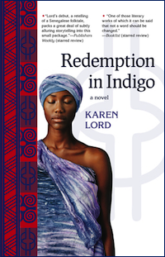In February of 2016, Fantastic Stories of the Imagination published an essay by me called “A Crash Course in the History of Black Science Fiction.” Since then Tor.com has published my in-depth essays on twelve of the 42 works mentioned. The original “Crash Course” listed those 42 titles in chronological order, but the essays skip around. This thirteenth column’s about Redemption in Indigo, Afro-Caribbean author and academic Karen Lord’s first novel.
SENEGALESE SCIENCE
 Combining her passions—one of Lord’s degrees is in science and the other in the sociology of religion—Redemption retells a series of Senegalese folktales as part of its longer exploration of chaos and time. Paama, wife of the epic glutton Ansige, attracts the favorable attention of certain nonhuman entities, who bestow on her the power of actualizing less-than-likely events. These entities are known to Paama and her countrymen as djombi, for as Lord notes, generation upon generation of immortals influencing history can’t help but leave the impression in the collective awareness of something “going bump in the night or whatever.” Carefully even-handed language maintains the plausibility of scientific explanations for what goes “bump” while validating indigenous philosophies and attitudes toward the forces driving the universe. “Since this story is about Paama, we will use her country’s name for them,” declares the narrator.
Combining her passions—one of Lord’s degrees is in science and the other in the sociology of religion—Redemption retells a series of Senegalese folktales as part of its longer exploration of chaos and time. Paama, wife of the epic glutton Ansige, attracts the favorable attention of certain nonhuman entities, who bestow on her the power of actualizing less-than-likely events. These entities are known to Paama and her countrymen as djombi, for as Lord notes, generation upon generation of immortals influencing history can’t help but leave the impression in the collective awareness of something “going bump in the night or whatever.” Carefully even-handed language maintains the plausibility of scientific explanations for what goes “bump” while validating indigenous philosophies and attitudes toward the forces driving the universe. “Since this story is about Paama, we will use her country’s name for them,” declares the narrator.
THE VOICE OF THE STORYTELLER
The novel’s narrator addresses us directly like this several times throughout the book, anticipating audience objections to the likelihood of encountering giant talking insects in bars, and warning us that gluttons are not heaven-made matches for Julia Child-level cooks such as Paama. That narrative technique is a wonderful way to connect readers with Redemption’s traditional background. It also hearkens to, and in the end erases, the dichotomy often found in Western science dividing observer from observed. The storyteller is part of the story and acknowledged as such, rather than assigned the sort of objectivity that bills itself as complete.
GLUTTONY AND FOOLISHNESS
As noted a couple of times already, Paama’s husband Ansige is a glutton. He’s also a fool. In the original version of the tales on which Redemption is based, these two traits feed back and forth into each other in a grand symphony of fat-shaming. Mercifully, though she describes it, Lord refrains from ridiculing Ansige’s physique. His gluttony is merely an addiction hosting lazy, low-order “ill influences;” it’s not the cause of his pitiable dunderheadedness. An object lesson in humans’ personal responsibility for their choices and lives, Ansige illustrates the pitfalls lurking in freedom for us all.
MUNDANE MAGIC
Paama, the book’s heroine, is an amazing cook. A homely virtue, this culinary ability underscores Redemption’s feminist message. The power Paama wields is available to women of all levels of militancy. Her abandonment of her foolish husband is gossip-worthy but not an action outside the bounds of what any woman would undertake in similar circumstances. Indeed, it’s her patience and forbearance despite repeated and extremely humiliating provocation—Ansige accidentally kills others’ livestock and gets his head stuck in a pestle on the public square—that impresses the immortals with her worthiness to carry the Chaos Stick, emblem of the ability to change the flow of possibilities.
To Paama, the Chaos Stick appears as an everyday kitchen implement. Though made of ebony and inlaid with gold, it’s basically a paddle used for stirring porridge—kind of a West African version of Scotland’s spurtle. Stirring things up is how we make changes in the status quo, how we redistribute energy and matter, whether we’re doing so domestically or sorcerously or in accordance with scientific principles or all of the above.
And whether our stirring is racially or nonracially situated. While rooted in Senegalese mores, Redemption is a sophisticated story, one that people from many cultures will be able to relate to. It’s an Afrodiasporic author’s engagement with universal themes. It’s not about blackness, it is blackness—it’s blackness about how the world works, magically, scientifically, every day, in every way.
SACRED HACKING
Within the storyteller’s tale, a parable reveals a central truth of the novel that’s familiar to creators everywhere. It recounts the process of fictional composer Lewis creating a musical diptych: the second half he writes in twenty-four hours, effortlessly transcribing music revealed to him via divine inspiration, while the first half is cobbled together with much labor out of “orphaned snippets” from his “musical ragbag.” The difference between these two methods is described as invisible to the piece’s audience, leading Paama to theorize that there’s an element of grace in struggle, and of struggle in grace.
As an author I’ve experienced both processes. Writing can come easily or with difficulty, and neither mode is a guarantee of the resulting text’s excellence. I’m certain Lord has been through the same sorts of scenarios herself—maybe even in the course of writing Redemption.
What do these two contrasting modes of creation have to say about divinity’s principle project: the generation of reality? Perhaps they say that inelegance is as inherent in the universe as intelligence. Perhaps that evolution’s trial-and-error methods can produce beauty and efficiency as surely as the more purposeful means deities are supposed to use. Probably that the truth doesn’t reside exclusively in either model of reality’s genesis. The best cooks, the best writers, employ whichever works.
COOKING A BOOK
Like Paama, Lord’s wise-blooded and well-practiced touch elevates a craft to an art. Food is made of more than ingredients, and stories are made of more than words. By focusing on a woman remarkable only for entirely female-identified skills and attitudes—cooking, kindness, patience—and by choosing for her book’s setting a non-exoticized Senegal complete with cities and bars and crops and pastures as well as plagues, jungles, and buried treasure, Lord offers us something vastly unlike the usual cliché-ridden accounts of mortals chosen to exercise enormous power. Redemption in Indigo mentally refreshes readers jaded by Joseph Campbell’s notorious monomyth. The characters of Paama, Ansige, and the indigo-skinned djombi, whose redemption provides the book’s title, help us to enjoy all marginal people’s quests and adventures, in the same way that learning to appreciate one dish from an unfamiliar cuisine helps us to appreciate many others.
 Nisi Shawl is a writer of science fiction and fantasy short stories and a journalist. She is the author of Everfair (Tor Books) and co-author (with Cynthia Ward) of Writing the Other: Bridging Cultural Differences for Successful Fiction. Her short stories have appeared in Asimov’s SF Magazine, Strange Horizons, and numerous other magazines and anthologies.
Nisi Shawl is a writer of science fiction and fantasy short stories and a journalist. She is the author of Everfair (Tor Books) and co-author (with Cynthia Ward) of Writing the Other: Bridging Cultural Differences for Successful Fiction. Her short stories have appeared in Asimov’s SF Magazine, Strange Horizons, and numerous other magazines and anthologies.










